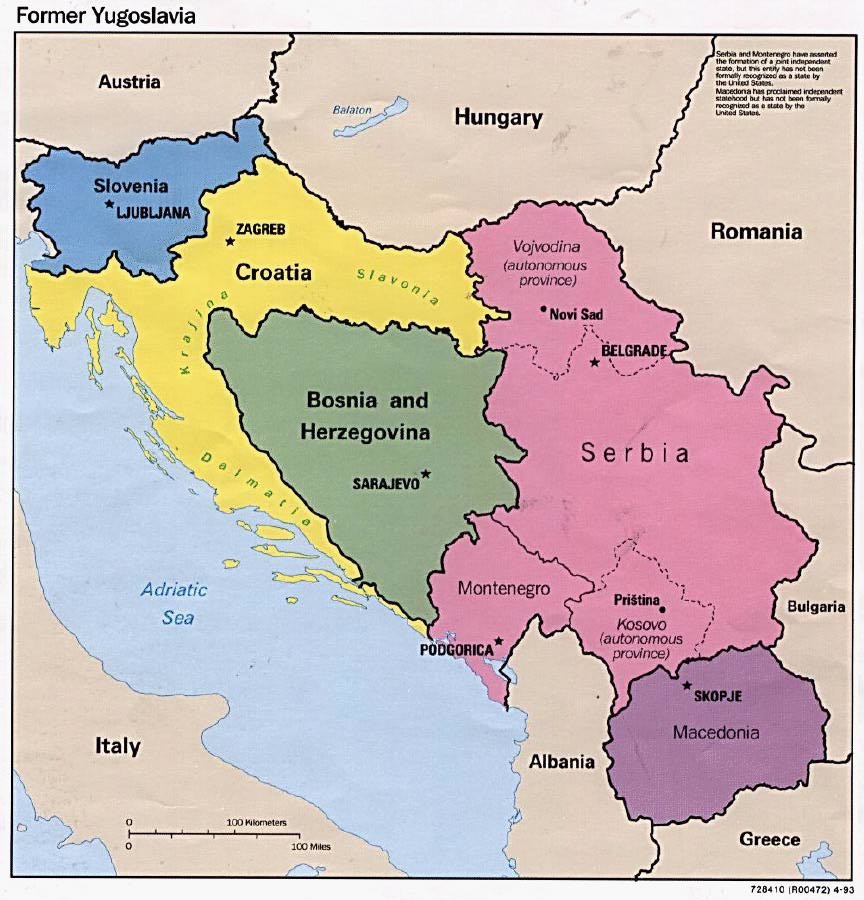
Some blame the Turks, but to be one up on them and since we visited Italy too, I will blame the Romans: 300 or so A.D.: the great schism, dividing the Western and Eastern portions of the Christian Church. Where? Right down the middle of the Balkans.
So now you have Catholic Croatians in the West and Orthodox Serbs in the East.
In 1389 the Turks whipped the Serbs in Kosovo at the battle of Kosovo Polje. They proceeded to take over much of Serbia and Bosnia, but not Croatia. Many local people, especially in the towns, converted to Islam. So over a period of 500 years you got: Bosnian Muslims. Actually you got numerous Muslims in some areas of Serbia too, but who's counting? Oh yes, and this also had the effect of moving quite a number of Serbs into areas near the Bosnian-Croation border near Dalmatia.
The still-Christian Serbs didn't like living under the Turks, and many simply didn't like the Turks. They would periodically revolt, but the Turks periodically made it clear that they did not like revolting Serbs, and put them down.
Not to be outdone, the Austro-Hungarians occupied Bosnia and Croatia in the nineteenth century, and increased the influence of their culture, especially in Croatia.
Now we are really getting warmer. The Germans occupied the area during WWII with assistance of the Italians. The Croatians got a government that was not just collaborationist, but enthusiastically and brutally fascist. They eventually killed some hundreds of thousands of Serbs, Gypsies, and others, many in extermination camps.
The rest of the country got Cetniks and Partizans. The Cetniks were Serb nationalist, royalist fighters. The Partizans were more broad-based, and led by Josip Broz, generally known by his nickname "Tito". The Partizans proved to be much more effective, more respectable, and eventually won the official support of the western allies. When the war was over and the Germans left the region without invasion by either Russia or the West, Tito was undisputed leader.
Tito brought communism because he was already a communist, not because the Soviet Union enforced it. He brought his own liberal brand of communism, and famously did not submit to Stalin. After Tito died in 1980 things got increasingly messy. There was a lack of strong central power, and as the Soviet Union crumbled, western aid to Yugoslavia withered, leading to inflation and less rosy economic times.
By 1990, Yugoslavia started to disintegrate.
Yugoslavia after Tito wound up in a position where there wasn't enough central authority to hold things together, and it lacked the institutions and the leadership to allow it to come apart gracefully.
Nazi leader Hermann Goering, interviewed by Gustave Gilbert during the Easter recess of the Nuremberg trials, 1946 April 18, quoted in Gilbert's book "Nuremberg Diary."
Goering: Why, of course, the people don't want war. Why would some poor slob on a farm want to risk his life in a war when the best that he can get out of it is to come back to his farm in one piece.
Naturally, the common people don't want war; neither in Russia, nor in England, nor in America, nor for that matter in Germany. That is understood. But, after all, it is the leaders of the country who determine the policy and it is always a simple matter to drag the people along, whether it is a democracy, or a fascist dictatorship, or a parliament, or a communist dictatorship.
Gilbert: There is one difference. In a democracy the people have some say in the matter through their elected representatives, and in the United States only Congress can declare wars.
Goering: Voice or no voice, the people can always be brought to the
bidding of
the leaders. That is easy. All you have to do is tell them they are
being
attacked, and denounce the pacifists for lack of patriotism and
exposing the
country to danger. It works the same in any country.